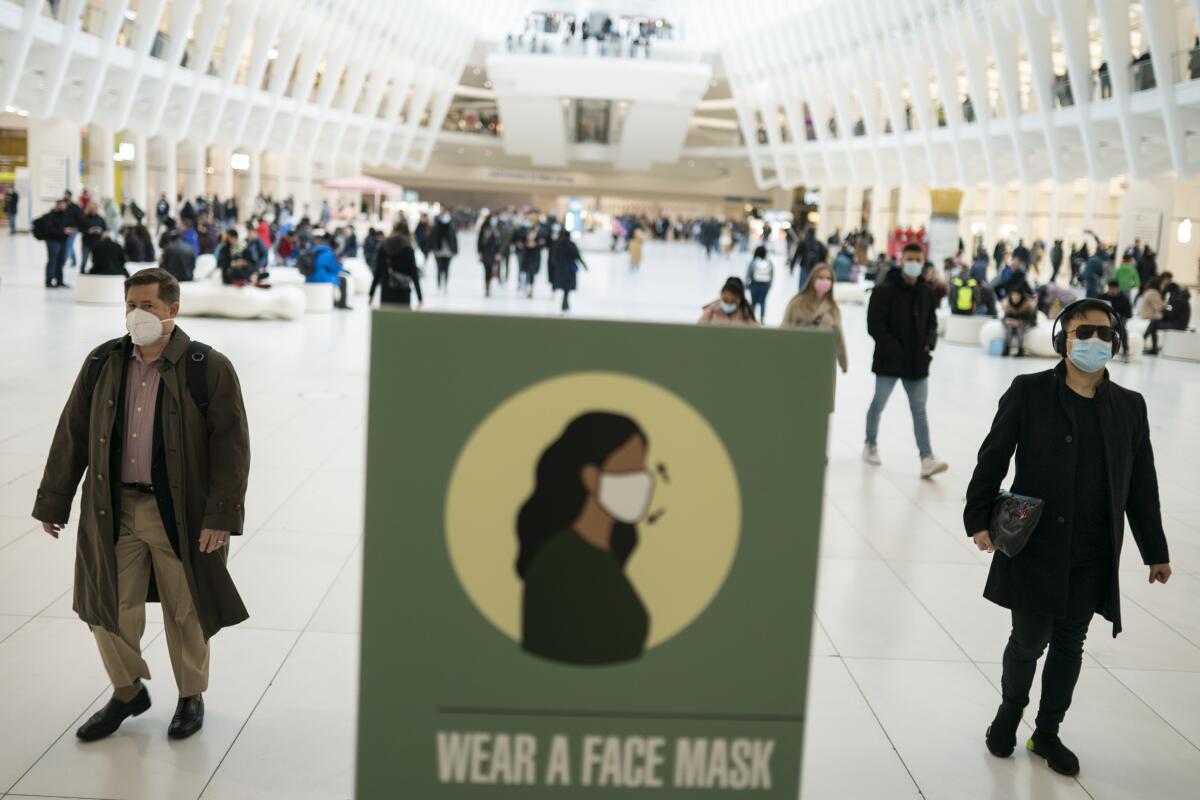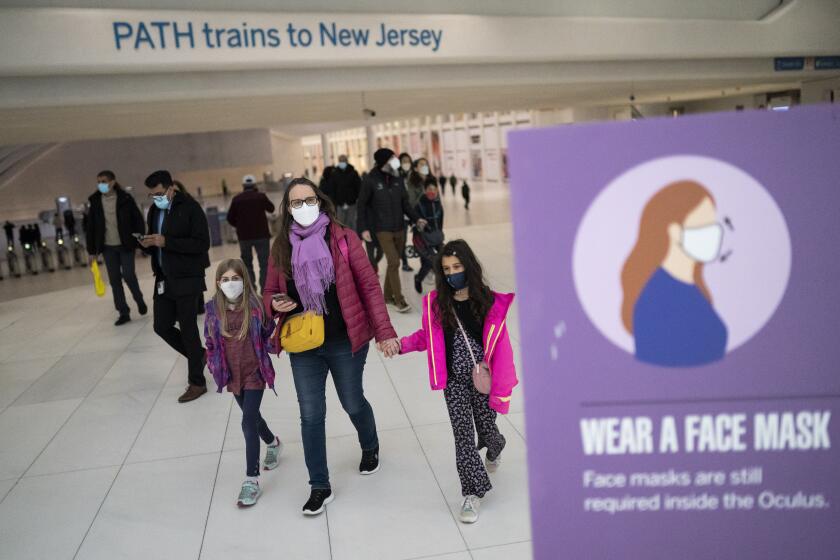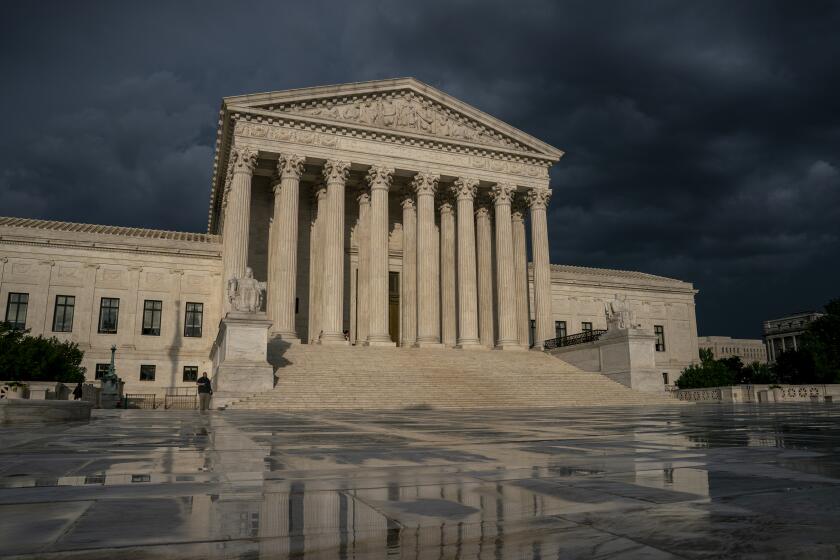Op-Ed: Abolish the courts’ wanton use of nationwide injunctions

One federal district court judge should not be able to halt a federal government policy for the entire country. Yet that is exactly what happened when Judge Kathryn Kimball Mizelle, in Tampa, Fla., ended the mandate for masks on airplanes, in airports, and on other forms of mass transportation. Within minutes of her ruling, some airlines — including for planes in midair — announced an end of their mask requirement.
News reports focused on Mizelle’s “not qualified” rating by the American Bar Assn. and her astoundingly narrow interpretation of the powers of the Centers for Disease Control and Prevention that, if upheld on appeal, will leave the agency without the authority to act against communicable diseases in the future.
What seems to have escaped attention is the urgent need to eliminate the power of a single federal judge to issue a nationwide injunction to stop the federal government from enforcing a law or policy as to anyone in the United States — regardless of whether a broad injunction is necessary to provide relief for the plaintiff in the case.
The federal judge who nixed masks shouldn’t even be on the bench.
This is not a partisan issue. There have been nationwide injunctions issued against policies created by both Democratic and Republican administrations. Critics of such injunctions include staunch conservatives, like Justice Clarence Thomas, who called them “legally and historically dubious.” More recently, federal appeals court judge Jeffrey Sutton, a George W. Bush appointee, wrote, “All in all, nationwide injunctions have not been good for the rule of law. ... The sooner they are confined to discrete settings or eliminated root and branch the better.”
Nationwide injunctions impose restrictions on people who were not defendants in the lawsuit — and in doing so, these rulings expand the power of the district courts beyond all reason.
Although there is some dispute over the history, nationwide injunctions were unknown until the 1960s, rare until the 21st century, and have dramatically increased over the last decade. They have been used by liberal judges to block the military’s “don’t ask, don’t tell policy” on gay troops, and by conservative judges to enjoin the Obama administration’s immigration policies.
No statute or Supreme Court decision authorizes nationwide injunctions. It is a power that federal courts have claimed as part of their authority to prohibit unconstitutional or illegal federal government actions. Ordinarily, one district court judge has no legal authority to bind other judges, just as one federal court of appeals has no authority to bind courts of appeals elsewhere in the country. Yet that is exactly the effect of a nationwide preliminary injunction: Mizelle issued a mask ruling that applied to the entire United States.
Of course, there is nothing to stop another federal judge from hearing a case on the same issue, coming to an opposite conclusion and issuing a nationwide injunction that would conflict with the one already in place. That would put the federal government in the impossible position of deciding which ruling to follow.
Many students are dispirited because as far into the future as they can see, the court appears likely to do more harm than good to democracy.
Nationwide injunctions also encourage forum shopping. A party wanting to stop a federal policy for the whole country will file the lawsuit in a district court where the judges are most likely to be receptive. Not surprisingly, challenges to policies of Democratic administrations — such as the Affordable Care Act and Deferred Action for Childhood Arrivals — were filed in a federal district court in Texas with very conservative justices. And challenges to the policies of former President Trump were often filed in federal courts in California, where there was a greater chance of a liberal judge being assigned to the case.
The Supreme Court could end this practice by making it clear that a federal district court judge’s ruling has no effect outside of that district and that a court of appeals’ decision has no effect outside of its circuit.
Alternatively, Congress could enact legislation restricting the power of the federal district courts to issue nationwide injunctions. Congress has broad authority to establish and structure the lower federal courts, including by making rules governing court proceedings. In fact, a few years ago, the House Judiciary Committee proposed the Injunctive Authority Clarification Act of 2018, which would have ended the practice of nationwide preliminary injunctions.
Not surprisingly, when there is a Democratic president, conservative litigants seek nationwide injunctions to halt federal policies. And the reverse occurs when there is a Republican president, with progressives turning to the federal courts. Regardless of the politics, it makes no sense to give one federal trial court judge the power to make a rule binding for the entire country.
Mizelle’s misguided mask mandate decision is only the latest example of a bad practice that undermines orderly judicial processes and should be rejected by both sides of the partisan divide.
Erwin Chemerinsky is dean of the UC Berkeley School of Law and a contributing writer to Opinion. He is the author, most recently, of “Presumed Guilty: How the Supreme Court Empowered the Police and Subverted Civil Rights.”
More to Read
A cure for the common opinion
Get thought-provoking perspectives with our weekly newsletter.
You may occasionally receive promotional content from the Los Angeles Times.












